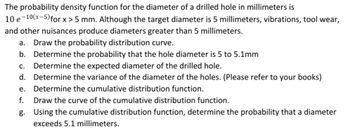The probability density function for the diameter of a drilled hole in millimeters is 10 e 10(x-5) for x>5 mm. Although the target diameter is 5 millimeters, vibrations, tool wear, and other nuisances produce diameters greater than 5 millimeters. a. Draw the probability distribution curve. b. Determine the probability that the hole diameter is 5 to 5.1mm c. Determine the expected diameter of the drilled hole. d. Determine the variance of the diameter of the holes. (Please refer to your books) e. Determine the cumulative distribution function. f. Draw the curve of the cumulative distribution function. g. Using the cumulative distribution function, determine the probability that a diameter exceeds 5.1 millimeters.
The probability density function for the diameter of a drilled hole in millimeters is 10 e 10(x-5) for x>5 mm. Although the target diameter is 5 millimeters, vibrations, tool wear, and other nuisances produce diameters greater than 5 millimeters. a. Draw the probability distribution curve. b. Determine the probability that the hole diameter is 5 to 5.1mm c. Determine the expected diameter of the drilled hole. d. Determine the variance of the diameter of the holes. (Please refer to your books) e. Determine the cumulative distribution function. f. Draw the curve of the cumulative distribution function. g. Using the cumulative distribution function, determine the probability that a diameter exceeds 5.1 millimeters.
MATLAB: An Introduction with Applications
6th Edition
ISBN:9781119256830
Author:Amos Gilat
Publisher:Amos Gilat
Chapter1: Starting With Matlab
Section: Chapter Questions
Problem 1P
Related questions
Question
asap, answer a, b, c

Transcribed Image Text:The probability density function for the diameter of a drilled hole in millimeters is
10 e 10(x-5) for x>5 mm. Although the target diameter is 5 millimeters, vibrations, tool wear,
and other nuisances produce diameters greater than 5 millimeters.
a. Draw the probability distribution curve.
b. Determine the probability that the hole diameter is 5 to 5.1mm
c. Determine the expected diameter of the drilled hole.
d.
Determine the variance of the diameter of the holes. (Please refer to your books)
e. Determine the cumulative distribution function.
f. Draw the curve of the cumulative distribution function.
g.
Using the cumulative distribution function, determine the probability that a diameter
exceeds 5.1 millimeters.
Expert Solution
This question has been solved!
Explore an expertly crafted, step-by-step solution for a thorough understanding of key concepts.
This is a popular solution!
Trending now
This is a popular solution!
Step by step
Solved in 2 steps with 2 images

Follow-up Questions
Read through expert solutions to related follow-up questions below.
Follow-up Question
For follow up question, please answer d, e, f, g. I will like again.

Transcribed Image Text:The probability density function for the diameter of a drilled hole in millimeters is
10 e 10(x-5) for x>5 mm. Although the target diameter is 5 millimeters, vibrations, tool wear,
and other nuisances produce diameters greater than 5 millimeters.
a. Draw the probability distribution curve.
b. Determine the probability that the hole diameter is 5 to 5.1mm
c. Determine the expected diameter of the drilled hole.
d.
Determine the variance of the diameter of the holes. (Please refer to your books)
e. Determine the cumulative distribution function.
f. Draw the curve of the cumulative distribution function.
g.
Using the cumulative distribution function, determine the probability that a diameter
exceeds 5.1 millimeters.
Solution
Recommended textbooks for you

MATLAB: An Introduction with Applications
Statistics
ISBN:
9781119256830
Author:
Amos Gilat
Publisher:
John Wiley & Sons Inc

Probability and Statistics for Engineering and th…
Statistics
ISBN:
9781305251809
Author:
Jay L. Devore
Publisher:
Cengage Learning

Statistics for The Behavioral Sciences (MindTap C…
Statistics
ISBN:
9781305504912
Author:
Frederick J Gravetter, Larry B. Wallnau
Publisher:
Cengage Learning

MATLAB: An Introduction with Applications
Statistics
ISBN:
9781119256830
Author:
Amos Gilat
Publisher:
John Wiley & Sons Inc

Probability and Statistics for Engineering and th…
Statistics
ISBN:
9781305251809
Author:
Jay L. Devore
Publisher:
Cengage Learning

Statistics for The Behavioral Sciences (MindTap C…
Statistics
ISBN:
9781305504912
Author:
Frederick J Gravetter, Larry B. Wallnau
Publisher:
Cengage Learning

Elementary Statistics: Picturing the World (7th E…
Statistics
ISBN:
9780134683416
Author:
Ron Larson, Betsy Farber
Publisher:
PEARSON

The Basic Practice of Statistics
Statistics
ISBN:
9781319042578
Author:
David S. Moore, William I. Notz, Michael A. Fligner
Publisher:
W. H. Freeman

Introduction to the Practice of Statistics
Statistics
ISBN:
9781319013387
Author:
David S. Moore, George P. McCabe, Bruce A. Craig
Publisher:
W. H. Freeman